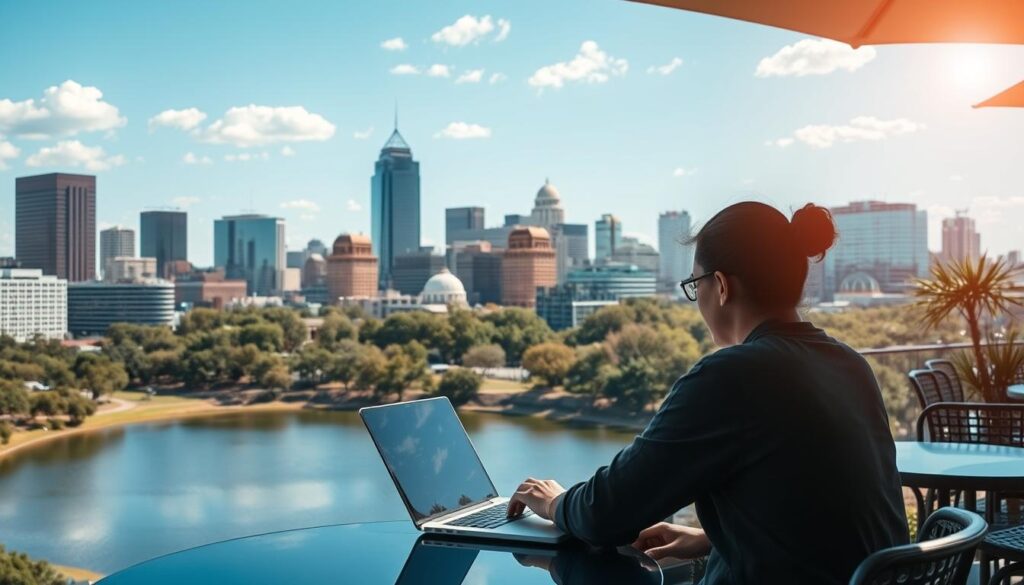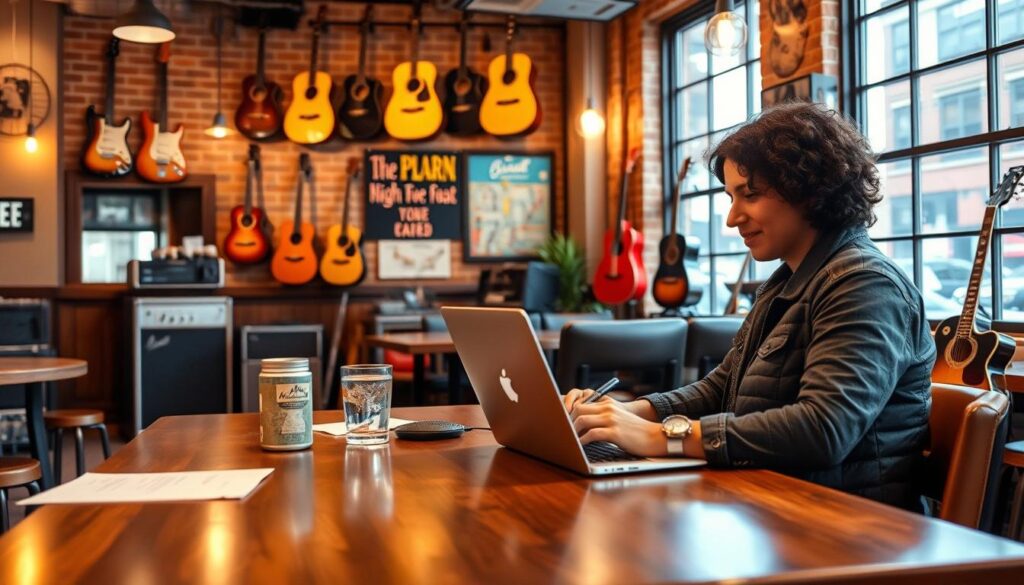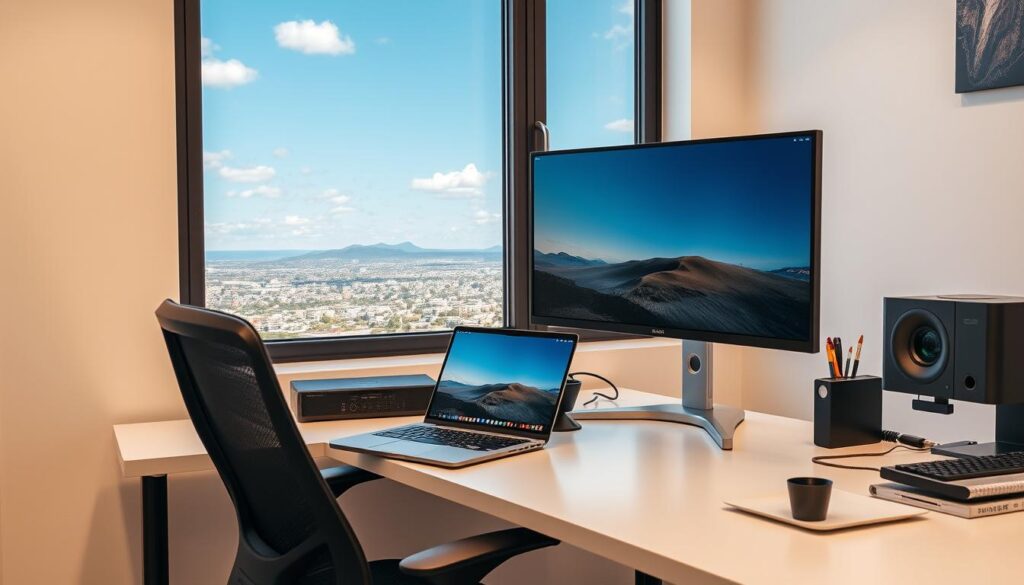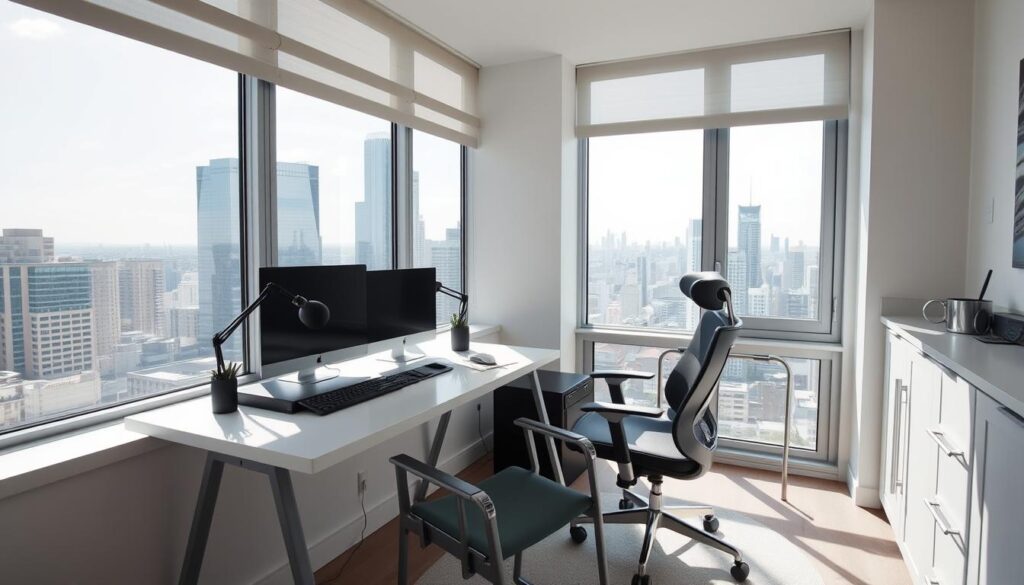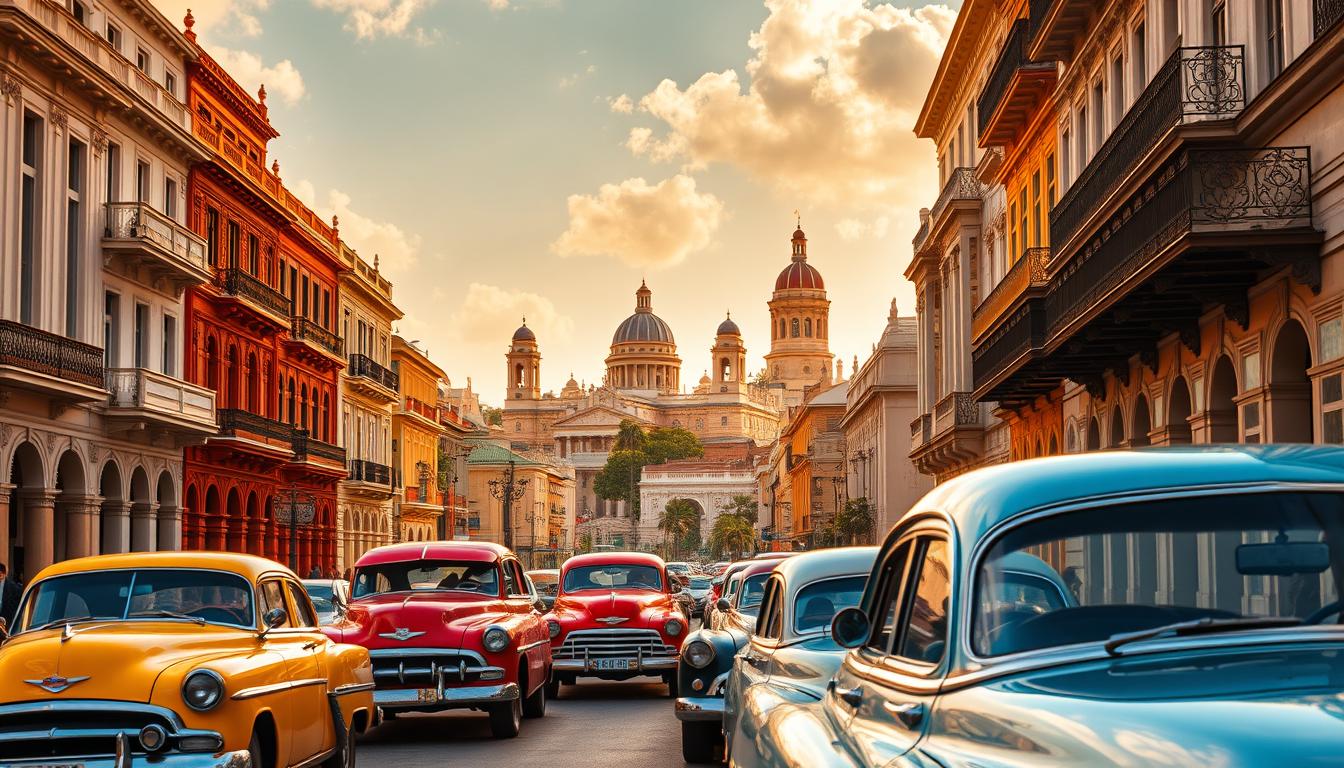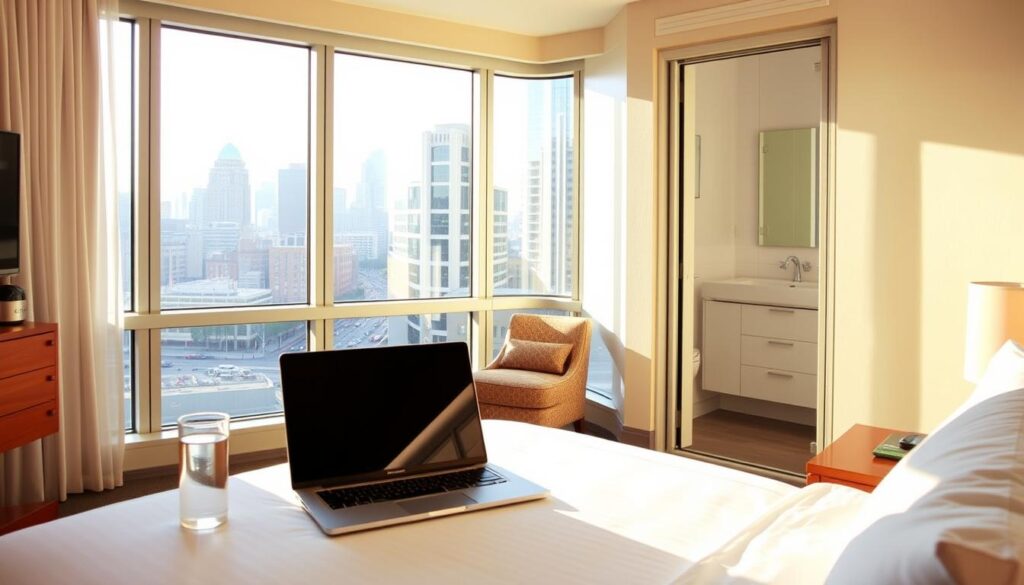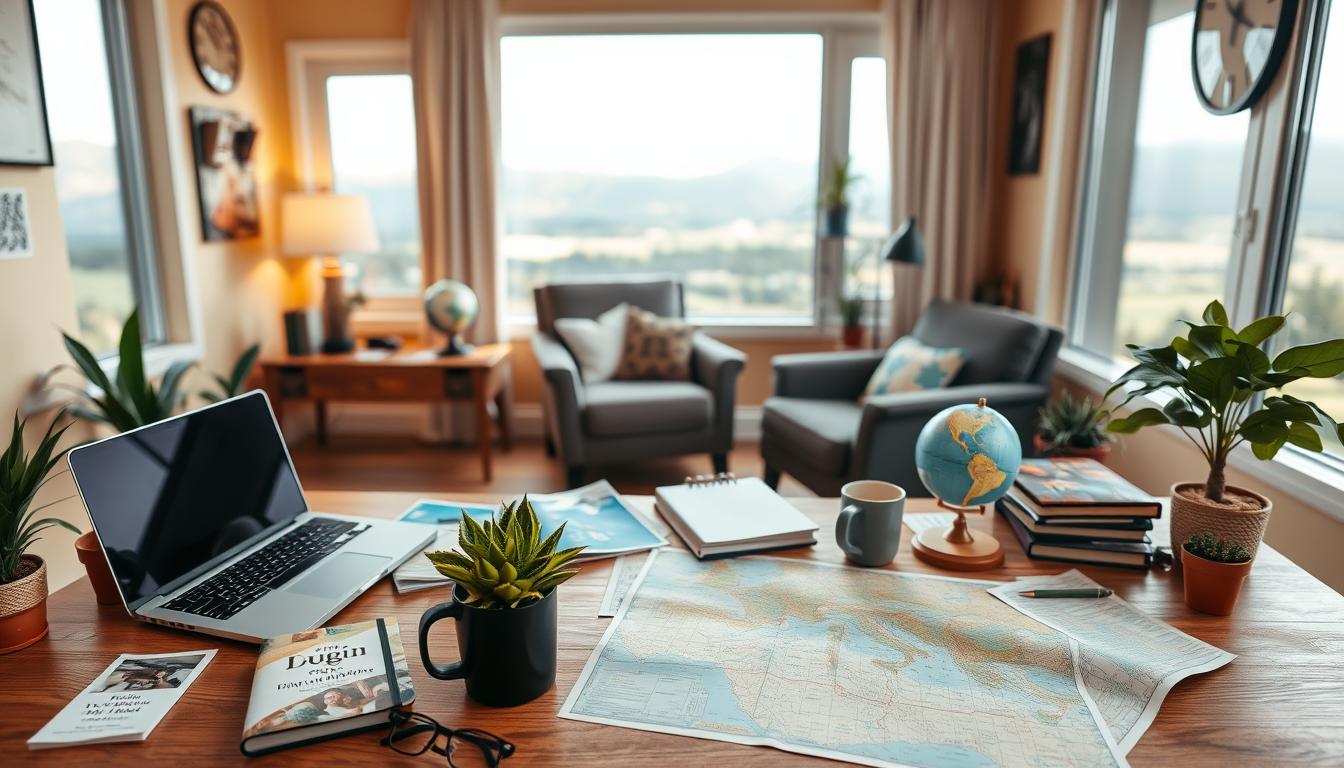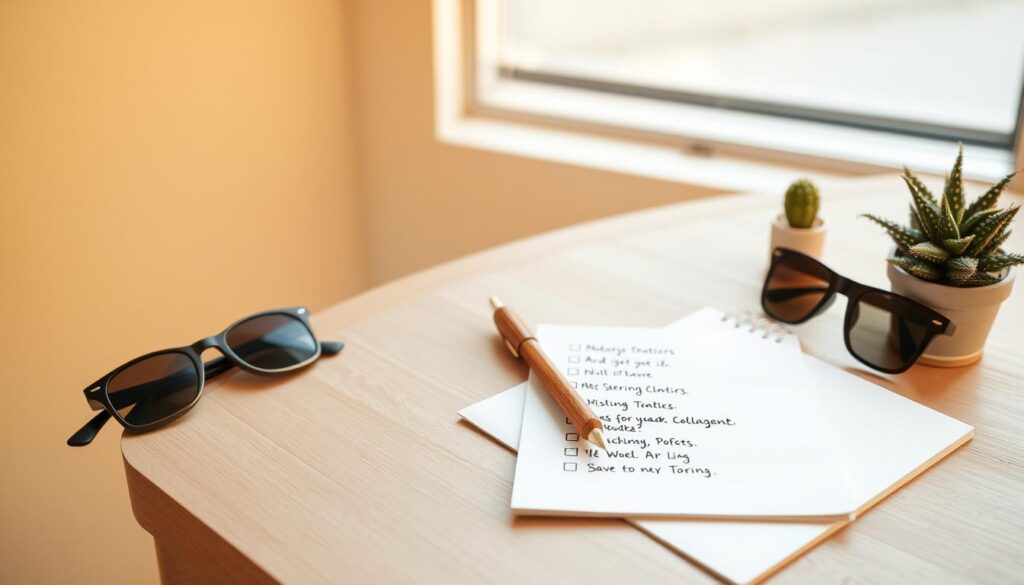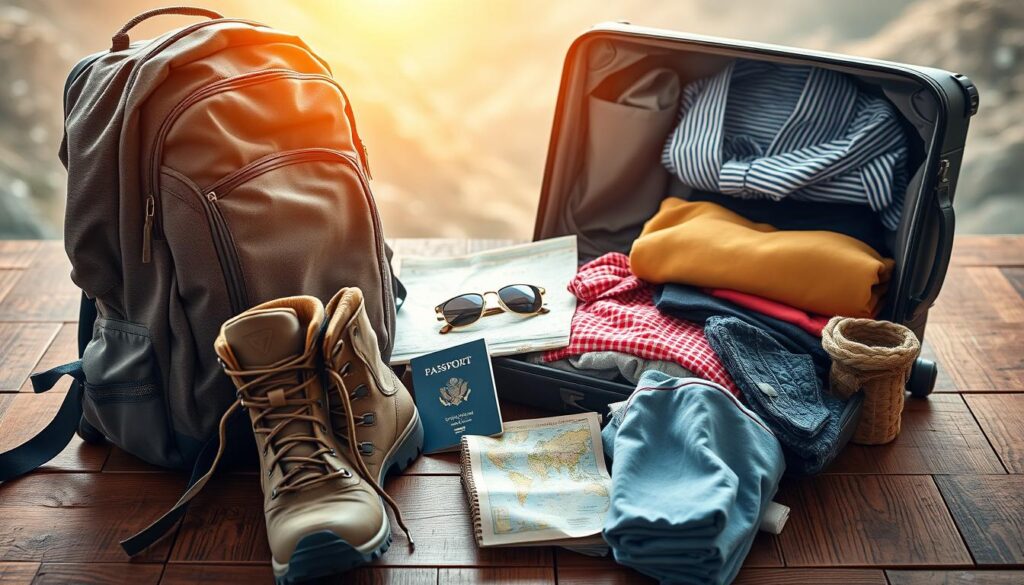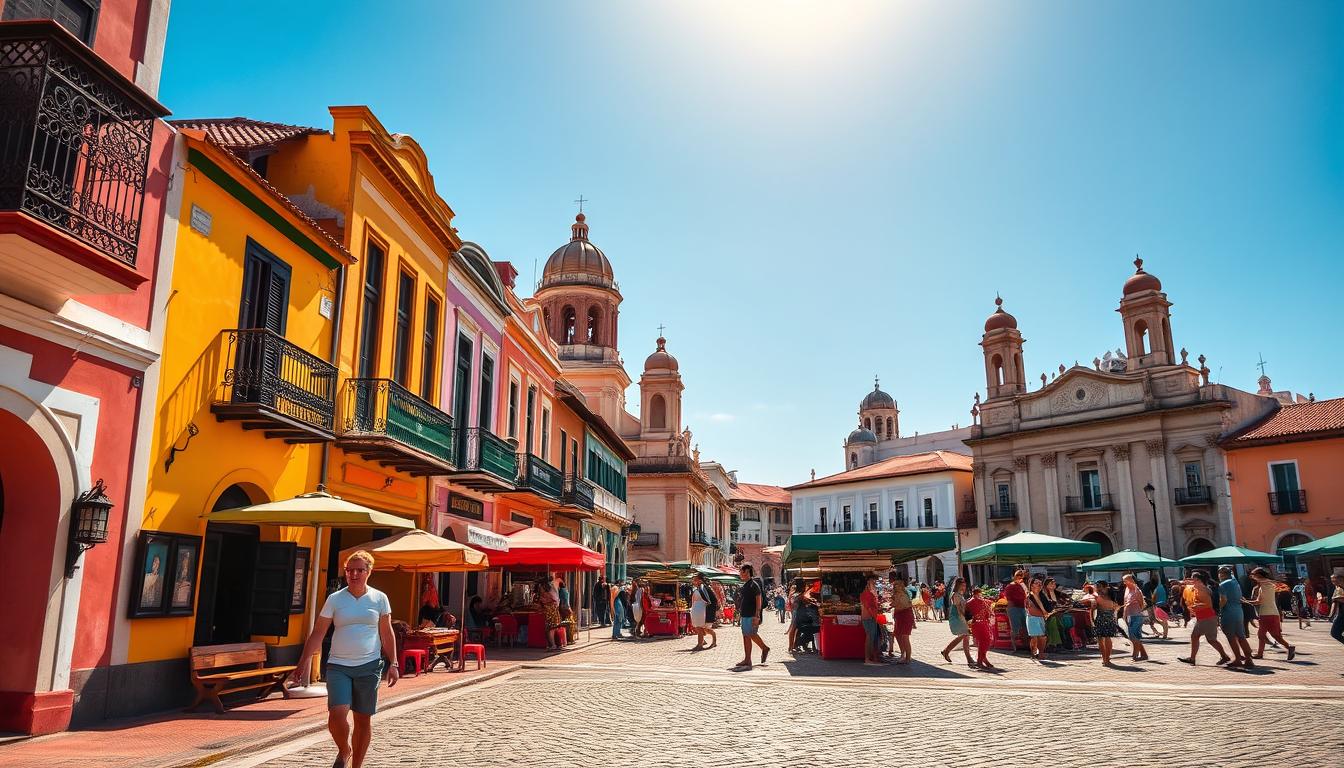The rise of remote work has created a new type of worker called digital nomads. They can work from anywhere with internet. Many are now looking at the central United States for a great work-life balance.
The central US is appealing because of its cost, culture, and internet access. It has beautiful landscapes and lively cities. This makes it a top choice for like-minded individuals wanting to explore.
Key Takeaways
- Central US is emerging as a hub for digital nomads.
- Affordability and connectivity are key attractions.
- Diverse landscapes and cultures offer a unique lifestyle.
- Growing communities of remote workers.
- Opportunities for adventure and exploration.
The Rise of Digital Nomadism in America
The United States is seeing a big increase in digital nomadism. This is because of the flexibility of remote work. It’s changing how people live, work, and travel around the country.
Reshaping American Cities
Remote work is changing American cities. It’s creating new remote work hubs. Cities with good internet, affordable living, and a high quality of life are becoming top cities for digital nomads.
This change is affecting how cities are planned and developed.
| City | Remote Work Index | Cost of Living |
|---|---|---|
| Austin, TX | 8.5 | Moderate |
| Denver, CO | 8.8 | High |
| Kansas City, MO | 8.2 | Low |
Post-Pandemic Migration Trends
The pandemic has made people move to cities that offer a good balance of work and fun. Digital nomads want places with outdoor activities, cultural spots, and a strong tech scene. This trend is likely to keep growing as remote work becomes more common.
What Makes a City Ideal for Digital Nomads
For digital nomads, the perfect city is a mix of tech, affordability, and community. When looking at a city, several important factors are key. They make sure digital nomads can live their lifestyle fully.
Internet Infrastructure and Connectivity
A strong internet is vital for digital nomads. Cities with reliable and fast internet attract remote workers. They need high-speed internet and co-working spaces with great connectivity.
Cost of Living Considerations
The cost of living is also key. Affordable cities in Central USA are great because they’re cheaper but don’t lack quality. Digital nomads can live well, with housing, food, and fun, at lower costs than big cities.
Community and Networking Opportunities
A strong community is essential for digital nomads. Cities with co-living spaces for digital nomads and events are perfect. They let remote workers meet, work together, and make lasting connections.
| City Attribute | Importance for Digital Nomads | Examples |
|---|---|---|
| Internet Infrastructure | High | Fast and reliable internet, co-working spaces |
| Cost of Living | High | Affordable housing, food, and entertainment |
| Community Opportunities | High | Co-living spaces, networking events |
Digital Nomad Communities: Finding Your Tribe in Central USA
The heart of Central USA is alive with energy, attracting digital nomads. Remote workers find a wealth of opportunities for connection and collaboration here.
Co-working Spaces and Innovation Hubs
Central USA is filled with co-working spaces and innovation hubs for digital nomads. These places offer more than desks and Wi-Fi. They are platforms for networking, skill-sharing, and building community.
Cities like Kansas City and Des Moines have many co-working spaces. They host events, workshops, and meetups for remote workers.
Some notable co-working spaces in the region include:
- The WeWork chain has multiple locations across Central USA, providing a familiar environment for digital nomads.
- The Kansas City Startup Village is a hub for entrepreneurs and remote workers, with access to resources and networking opportunities.
- The Des Moines CoLab offers a collaborative environment with events and workshops for the local startup community.
Online Forums and Meetup Groups
Online forums and Meetup groups are key for connecting digital nomads in Central USA. They allow remote workers to share knowledge, find support, and organize meetups. Facebook groups and platforms like Nomad List and Remote Year are popular.
“The sense of community is what drew me to the digital nomad lifestyle in Central USA. Being part of online forums and attending local meetups has been invaluable.” – Sarah, digital nomad
Here’s a look at some popular online forums and Meetup groups:
| Platform | Focus | Location |
|---|---|---|
| Nomad List | Global digital nomad community | Online |
| Remote Year | Co-living and workspaces for remote workers | Global with local meetups |
| Digital Nomads Kansas City | Local events and networking | Kansas City, MO |
Austin, Texas: The Remote Work Capital of Central USA
Austin, Texas, is a top spot for remote workers. It has a strong tech scene and a lively culture. This makes it a great digital nomad hotspot.
Thriving Tech Ecosystem
Austin’s tech industry is growing fast. Many startups and big companies are here. This gives remote workers lots of chances to meet and work together.
The city’s South by Southwest (SXSW) conference every year shows its creative side. It’s a big deal for innovation and creativity.
Cultural Attractions and Outdoor Activities
Austin is known for its culture and outdoor fun. There are lots of music spots, festivals, and events all year. Remote workers can try kayaking on Lady Bird Lake or hiking in Barton Creek Greenbelt.
This mix of culture and nature is perfect for those who want to work and play. It’s a great place to find balance.
Co-living Options for Digital Nomads
Austin has many co-living spaces for digital nomads. These places are great for working and meeting people. They offer flexible leases, fast internet, and fun events.
Choosing co-living spaces makes it easy to fit into the Austin vibe. It helps remote workers enjoy both work and play in Austin.
Kansas City, Missouri: The Silicon Prairie
Kansas City, Missouri, is becoming a top spot for digital nomads. It offers a great mix of a growing tech industry and a low cost of living. This makes it a perfect place for many.
Tech Scene and Job Opportunities
The tech scene in Kansas City is buzzing with life. You’ll find many startups and big companies like Google and IBM. They provide lots of job chances for remote workers.
The city also hosts tech events and conferences. These help build a community that loves to innovate and work together.
Affordable Housing and Quality of Life
Kansas City is famous for its affordable housing. This is a big plus for digital nomads thinking about moving here. The cost of living is lower than in many other big tech cities in the US.
Plus, the city has a great quality of life. You can enjoy many cultural spots and outdoor activities. It’s a place where you can live well and work well.
| Aspect | Kansas City | Other Cities |
|---|---|---|
| Cost of Living | Low | High |
| Tech Job Opportunities | Abundant | Variable |
| Quality of Life | High | Variable |
Denver, Colorado: Mountain Living for Remote Workers
Denver, Colorado, is a perfect mix of mountain beauty and a booming tech scene. It’s a top choice for digital nomads. The city’s high altitude and stunning natural surroundings offer endless outdoor fun. You can hike, ski, kayak, or cycle in the beautiful Rocky Mountains.
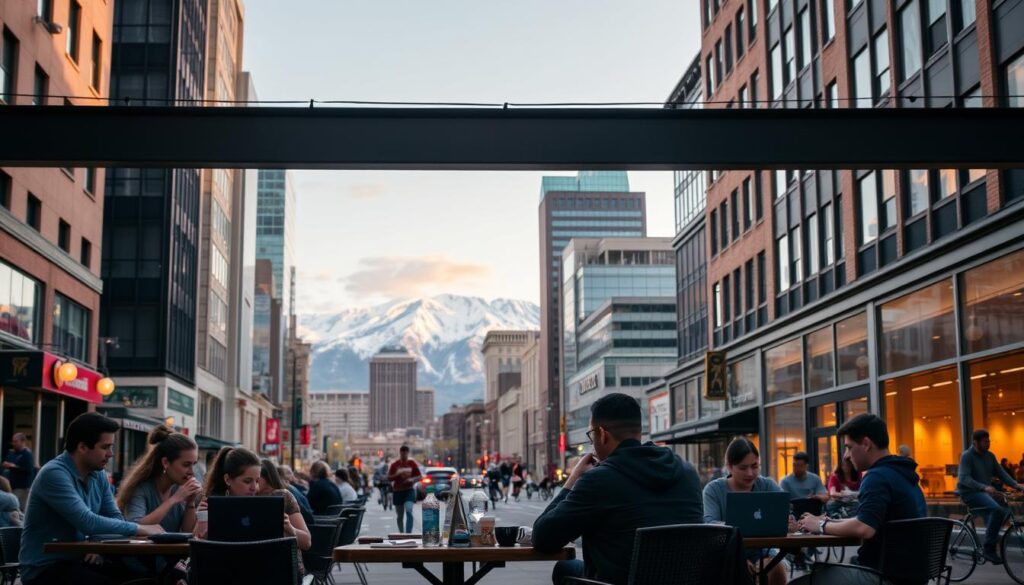
Work-Life Balance in the Rockies
Denver gives digital nomads a great balance between work and play. The city has many co-working spaces and a lively remote worker community. After work, you can explore the city’s cultural attractions, like museums, theaters, and music venues.
Denver’s outdoor recreation opportunities are a big plus. The Rocky Mountains offer a stunning view that’s hard to beat.
- Access to over 300 days of sunshine annually
- A thriving cultural scene with numerous festivals
- Proximity to nature and outdoor activities
Tech Industry Growth and Opportunities
Denver’s tech industry is booming, with many startups and big companies. Digital nomads can find jobs in software development, data analytics, and digital marketing. The city’s innovation hubs and tech meetups are great for networking.
- Software development and engineering
- Data science and analytics
- Digital marketing and e-commerce
Best Places to Live in Central USA for Budget-Conscious Nomads
The heart of America is filled with cities perfect for budget-friendly digital nomads. Central USA has a mix of affordability, culture, and connectivity that’s rare to find.
Tulsa, Oklahoma: Remote Worker Incentives
Tulsa, Oklahoma, is attracting remote workers with its incentives. It offers a cost-effective lifestyle with programs for digital nomads. Tulsa has a rich culture and modern amenities, making it great for work and play.
Des Moines, Iowa: Affordable Urban Living
Des Moines, Iowa, is known for its affordable urban living. It has a thriving tech scene, a lively culture, and a low cost of living. Digital nomads can live well without the high costs of big cities.
Omaha, Nebraska: Low Cost, High Quality of Life
Omaha, Nebraska, is a great mix of low cost and high quality of life. It has affordable housing, a diverse community, and a growing tech industry. Omaha also offers many parks and outdoor activities for a healthy balance between work and life.
| City | Cost of Living | Key Attractions |
|---|---|---|
| Tulsa, OK | Low | Remote worker incentives, cultural heritage |
| Des Moines, IA | Moderate | Thriving tech scene, urban amenities |
| Omaha, NE | Low | Affordable housing, diverse community |
As digital nomadism grows, Central USA cities are becoming top choices for remote workers. Places like Tulsa, Des Moines, and Omaha offer a great lifestyle at a low cost.
“The rise of remote work has opened up new opportunities for cities to attract talent. We’re seeing a shift towards more affordable and livable communities.” –
Small Town Digital Nomad Hotspots
Small towns are becoming popular among digital nomads who want a slower pace of life. These places offer a mix of community, affordability, and quality of life. This is something big cities often can’t match.
Bentonville, Arkansas: Walmart’s Tech Hub
Bentonville, Arkansas, is now a key tech hub thanks to Walmart. It has many amenities for digital nomads, like co-working spaces and events. The town also has the Crystal Bridges Museum of American Art, hosting cultural events all year.
Fayetteville, Arkansas: College Town Innovation
Fayetteville, home to the University of Arkansas, is gaining popularity among digital nomads. The university’s innovation center supports startups and entrepreneurs. The town’s lively culture and natural beauty make it a great place for remote workers.
Both Bentonville and Fayetteville show how small towns can attract digital nomads. They offer a balanced lifestyle and chances for professional growth.
Navigating Housing in Nomad-Friendly Towns
For digital nomads, finding good housing is key to a productive remote work life. Nomad-friendly towns offer a mix of lifestyle and work chances. But, housing choices can be few. It’s important to know the local housing market to find the right place.
Co-living Spaces for Digital Nomads
Co-living spaces are getting popular among digital nomads. They offer a community feel that helps with networking and teamwork. When looking at co-living, think about both short and long stays.
Short-term vs. Long-term Options
Short-term rentals give you flexibility to try out different places without being tied down. Long-term stays can save money and help you get to know the local community better.
Finding Community-Oriented Housing
For digital nomads, finding housing that feels like home is important. Look for co-living spaces that host events and have shared areas. This will make your living experience better.
Month-to-Month Rental Strategies
Month-to-month rentals offer flexibility for those who like to move around. To get the best deals, be ready to talk prices with landlords. Also, consider working with local real estate agents who know what digital nomads need.

Building Your Remote Career in Central USA’s Online Work Community
Digital nomads are moving to Central USA, looking to build remote careers. They need to network and understand local industries. The area’s online work community is growing, with many chances for career growth and learning.
Local Industries Embracing Remote Work
Central USA has many industries that welcome remote work. These include tech, healthcare, and finance. Companies in these fields are starting to offer flexible work options, opening doors for remote workers.
Key Industries:
- Tech: Cities like Kansas City and Des Moines are hubs for tech jobs, leading to remote work chances.
- Healthcare: With telemedicine growing, remote healthcare jobs are becoming more common.
- Finance: Banks and financial firms are starting to let employees work from anywhere.
Networking Strategies for Newcomers
Newcomers to Central USA’s online work community need good networking skills. They should join virtual events and meet people in person.
Virtual Networking Events
Virtual events are great for meeting remote workers and industry pros. Sites like Zoom and Google Meet host webinars and workshops. These can help newcomers grow their professional network.
In-Person Meetups for Remote Workers
Meeting people in person is key for networking and teamwork. Cities like Austin and Denver have meetups for remote workers. These events help build community and cooperation.
| City | Industry | Networking Opportunities |
|---|---|---|
| Austin | Tech | Regular meetups, conferences |
| Kansas City | Finance | Virtual events, industry workshops |
| Denver | Healthcare | In-person meetups, telemedicine webinars |
Practical Considerations for Central USA Remote Work Destinations
When digital nomads think about moving to central USA, they face many practical issues. These can affect their lifestyle and money. Knowing about these can help remote workers choose the right place.
State Income Tax Variations
State income tax is a big deal in central USA. For example, Texas doesn’t have state income tax. But, Iowa’s tax rates range from 0.33% to 6.98% based on income. It’s key for digital nomads to check the tax laws in their chosen states to save money.
Health Insurance and Benefits
Health insurance is also a big concern for digital nomads. They often have to buy their own. Central USA has different health insurance options. Places like Illinois and Ohio have more choices because of their big populations.
Conclusion: Creating Your Ideal Digital Nomad Lifestyle in Central USA
Central USA is a hotspot for digital nomads. Cities like Austin, Texas, offer a lively tech scene. Des Moines, Iowa, is great for those looking for affordable living.
Denver, Colorado, is perfect for nature lovers. Kansas City, Missouri, is a hub for innovation. Each city has its own community for digital nomads.
These cities have co-working spaces and online forums. They also have meetup groups for digital nomads. When picking a place, think about internet, cost of living, and fun activities.
Living as a digital nomad in central USA is rewarding. You get to work, play, and connect with others. Discover the best places and enjoy the region’s tech and quality of life.





